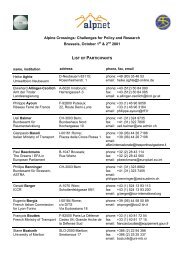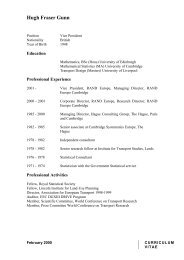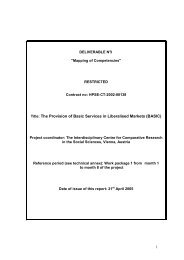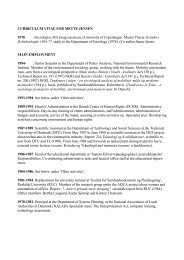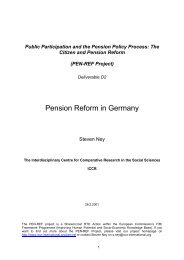The Housing Dimension of Welfare Reform - the ICCR
The Housing Dimension of Welfare Reform - the ICCR
The Housing Dimension of Welfare Reform - the ICCR
You also want an ePaper? Increase the reach of your titles
YUMPU automatically turns print PDFs into web optimized ePapers that Google loves.
3. <strong>Housing</strong> related characteristics (legal status, category, condition,<br />
burden <strong>of</strong> housing cost)<br />
4. Non–monetary deprivation (basic amenities, lifestyle, housing<br />
facilities and deterioration)<br />
<strong>The</strong> final model shows that <strong>the</strong> age <strong>of</strong> <strong>the</strong> main earner is <strong>of</strong> crucial<br />
importance, even when controlling for a number <strong>of</strong> additional socioeconomic<br />
characteristics. <strong>The</strong> poverty risk is highest among young adults<br />
who have an entry risk <strong>of</strong> more than four times that <strong>of</strong> persons <strong>of</strong><br />
retirement age.<br />
Of <strong>the</strong> above sets <strong>of</strong> variables <strong>the</strong> socio-economic characteristics <strong>of</strong> <strong>the</strong><br />
household and, particularly, <strong>the</strong> latter’s work attachment, are <strong>the</strong> most<br />
relevant with regard to entry into poverty. Individuals who live in<br />
persistently economically inactive households have 9.5 times <strong>the</strong> risk to<br />
fall into poverty as compared to persons living in working households.<br />
Persons living in households which slide into unemployment are five<br />
times more likely to enter into poverty than persons in working<br />
households. Becoming unemployed implies an even higher entry risk<br />
than when a household is persistently unemployed.<br />
<strong>The</strong> highest odds among household types are found for persons who live<br />
in a two-parent family whose risk to enter poverty is two times higher<br />
than for single persons. A somewhat unexpected finding is that in <strong>the</strong><br />
multivariate analysis single parents do not show a higher risk to enter<br />
poverty than singles or couples without children. This suggests that<br />
single parenthood is not in itself <strong>the</strong> main determinant <strong>of</strong> falling into<br />
poverty. It is ra<strong>the</strong>r <strong>the</strong> specific circumstances associated with single<br />
parenthood, such as <strong>the</strong> absence <strong>of</strong> employment opportunities or public<br />
or private transfer receipts, that make one-parent families more<br />
vulnerable to poverty than o<strong>the</strong>r groups. This might be easier to<br />
understand if distinction is drawn between one- and two-earner<br />
households. <strong>The</strong> risk for poverty appears to be highest when <strong>the</strong>re is only<br />
one (potential) in a two-parent household, i.e. when one <strong>of</strong> <strong>the</strong> two<br />
parents is inactive.<br />
A low educational attainment <strong>of</strong> all household members is a very<br />
distinctive characteristic that has strong influence on <strong>the</strong> entry into<br />
poverty. When <strong>the</strong> level <strong>of</strong> educational attainment is low or reduced due<br />
to <strong>the</strong> leave <strong>of</strong> at least one higher educated household member <strong>the</strong> entry<br />
risk is 1.7 – 2.1 times higher than when at least one household member<br />
has a middle or higher educational attainment.<br />
When looking at <strong>the</strong> housing dimension <strong>of</strong> entry rates we find that <strong>the</strong><br />
odds for individuals in private rented housing are most favourable. <strong>The</strong><br />
risk for owners is 40 per cent higher and that <strong>of</strong> persons in social housing<br />
EUROHOME-IMPACT FINAL REPORT 39



